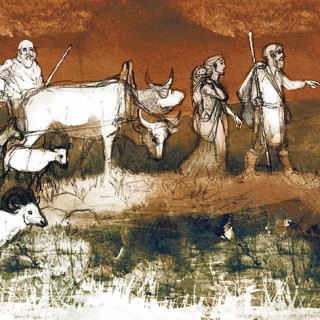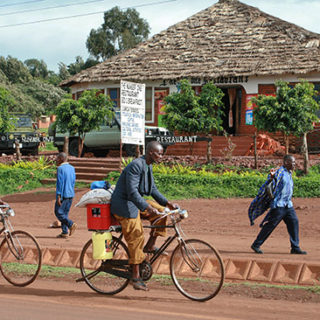International migration is the rule rather than the exception
Column by Sara Kalm, senior lecturer in Political Science
Migration is not a new phenomenon. In all of history, people have up and left, moving sometimes on their own, more often in groups. During the past few hundred years, this has taken place in relation to the international nation system that organises people according to territorial and national boundaries. Despite the fact that the nation state emerged in a time characterised by extensive mobility and the “discovery” of new cultures on continents previously unknown to Europeans, the system is based on an assumption of people as normally domiciled within their countries’ borders, and that international migration is the exception rather than the rule.
HOWEVER, there have been many different forms of migration control. These days we assume that the state has the right to control immigration, and we consider this to be a central dimension of our sovereignty. Yet, the modern system with passports, visas and border controls wasn’t established until the time of WWI, in other words, only about 100 years ago. During the last few decades of the 19th century, many countries discontinued their controls and let people move freely across nation borders. Distinctions having to do with race and class remained in practice. Still, it is interesting that at this time, characterised by rapid internationalisation of the economy, and on the basis of liberal values, it was considered equally fundamental to let people move freely as to allow free trade. At the International Emigration Conference in 1889, it was for instance declared that “We affirm the right of the individual to the fundamental liberty accorded him by every civilized nation to come and go and dispose of his person and destinies as he pleases”.
“The modern system with passports, visas and border controls was established only about 100 years ago.”
QUICKER AND CHEAPER MODES OF TRANSPORTATION and communication have, together with the economic globalisation and new patterns of conflict, lately affected the forms of migration. Most people continue to move within their region, but it has become increasingly common to relocate to places further away. It is also more common for women to relocate without their families. Furthermore, migration tends to be a short-term and circular occurrence rather than a permanent one, and transnational networks with political and cultural ties to several countries have emerged. Migrants send parts of their salaries back home, so-called remits, and these play an important role for many countries’ economies. Many people now recognise the positive effects of migration in terms of a country’s development. A few years ago, a collaborative forum – Global Forum on Migration and Development – was established, in which Sweden has played a leading role, and where these types of issues are discussed by representatives of both rich and poor countries. However, this optimistic view on migration has so far not dominated the discussion.
MIGRATION IS AN AREA of international politics in which the state has almost absolute decision-making power. The UN Universal Declaration of Human Rights from 1948 stipulates that everyone has the right to freedom of movement and residence within the borders of each state, to leave any country, including their own, and to return to their country. In other words, you have the right to leave your country, but you are not guaranteed that you will be received elsewhere; rather, it is the receiving country’s right to determine their immigration policy. Right or wrong, this asymmetry is fundamental to current forms of international migration control. The state’s discretion when it comes to immigration has one main exception, and this concerns refugees. After the destruction caused by two world wars in the form of expulsion, forced displacement, tattered relations, and the resulting human suffering, the nations around the world managed to agree to protect those most in need. A clearly delimited category of refugees, defined in the Geneva Convention from 1951 and other agreements, could now not be deported to areas in which their safety was at risk. Over the following decades, activists, researchers and journalists have occasionally raised their voices in favour of an expanded definition of ‘refugee’, so that the responsibility includes those who for instance flee from starvation or environmental disasters. Currently, such arguments seem far removed from the Swedish debate. Since the drastic increase in the flow of refugees last year, the tone has hardened, and we now often hear arguments saying that refugee law should be abolished completely. It is then important to consider how difficult it was to achieve in the first place, how fragile and limited it is, and above all, that it is precisely in situations like the one today for which it is necessary.

Sara Kalm
Facts
-
Sara Kalm





